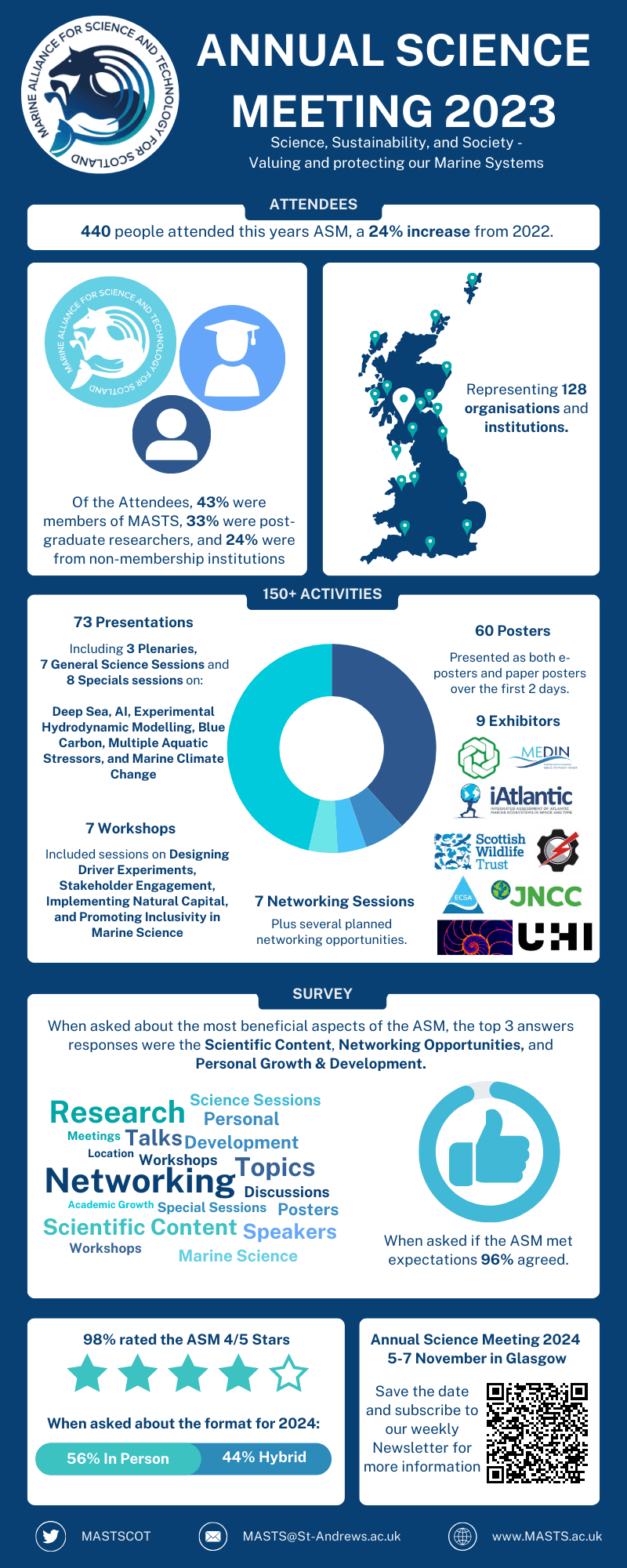
More details about our 2024 Annual Science Meeting will come out in early summer, so check back then, or ensure you are signed up to our mailing list to receive notifications. If you are interested in organising a special session or workshop, it is never too early to get in touch via [email protected] – we would love to hear from you.
5th-7th December at the Technology & Innovation Centre (TIC), University of Strathclyde, Glasgow
The thirteenth MASTS Annual Science Meeting was a cross-disciplinary event that brought together members of the marine science community, with the aim of promoting and communicating research excellence and forging new scientific collaborations. The event took place in-person in Glasgow, although we also provided some limited online attendance options too.
The first two days brought together expert plenary speakers and contributed talks, panel sessions and e-posters outlining the latest research and management practices that addressed key topics related to marine science and management in the face of global climate change and a biodiversity crisis. Alongside our general science sessions, the event included special topic sessions, and plenty of opportunities to network. The third day was devoted to workshops.
General Science sessions were supported by special sessions on
* An ePoster is an electronic version of the traditional poster boards, and is displayed on a TV monitor/screen. The ePoster may include text, figures and images, as well as video and animation. Read our guidelines here. Eposters will need to be submitted to [email protected] before close on xx/11/24.
We encourage all presenters to read our general accessibility guidance here to ensure our event is available to all.
Details of confirmed workshops are below.
SUT, MASTS and the D’Arcy Thompson Forum present the 11th Salvage, Decommissioning & Wreck Removal Workshop. The (second) energy upheaval and data.
Keynote from Maggie Chapman, MSP
The sessions within the workshop this year and the presentations from these can be viewed from the links below:
The transparency of the energy upheaval
Circular economy and offshore wind – Starting with the end in mind
Environmental impacts & Emergency response
Digital technology as a tool
Quickfire PhD/Researcher updates
Please see Flyer and agenda with bios for more details on this workshop
Scotland’s Marine Assessment 2020, together with recent publications from the Marine Climate Change Impacts Partnership, provides a comprehensive overview of the latest evidence on the impacts of climate change in Scotland’s marine and coastal systems. However, the evidence base is continually evolving, and this workshop will seek to bring together the latest knowledge, building upon the insights shared during the preceding day’s Marine Climate Change special session.
A next stage in the workshop will involve inviting participants to define pathways for action by government, business, and researchers to inform climate change adaptation. Following the workshop, we aim to produce a summary document for sharing with key MASTS stakeholders, including government policy makers.
This workshop will use a role play simulation board game as an experiential learning method. Attendees will take on roles as members of government, business, NGOs or community organisations involved in the planning and management of marine space. Cast instructions will be sent in advance of the workshop.
The role play will be facilitated by environmental geographer Dr Tim Stojanovic (University of St Andrews) who has a 25 year research profile in marine planning and coastal management, and is a former chair of the MASTS MPG Forum. The scenario for this simulation has been developed using imaginary geography of a large area of ocean, bordered by two coastal nations and a shared sea (see figure below). The role play also provides a useful training exercise to develop transferrable skills in analysis, communication, negotiation and team working which are important in professional practice. The simulation also enables reflection on the challenges of implementing marine planning; managing human activities and their conflicts; and achieving cooperation, integration and sustainability. It will also hopefully be fun!
Max 20 participants
This workshop will present an open-source and user-friendly machine learning tool capable of measuring surface area and species count from images. The workshop will demonstrate the tool’s key features, such as its intuitive training process, in-built metrics calculator and model-sharing capabilities. During the workshop, attendees will be guided through the installation of the tool and gain first-hand experience in training models on a practice dataset. The workshop is open to all and no previous experience with machine learning or image analysis is needed. Please bring your laptop and charger and make sure you have your institute’s permission to download software on your laptop.
By the end of the workshop, attendees will have learned how to use RootPainter to analyse still images automatically. The workshop will also help foster new collaborations between MASTS attendees on the topic of machine learning and still image analysis.
Max 20 participants
Designing experiments that measure the response of marine organisms to multiple simultaneous environmental changes requires a good understanding of how to translate questions about biotic response to multiple drivers into a tractable research question, and then how to design and analyse an experiment that actually answers the question.
This workshop is aimed at students and early career researchers new to multiple driver experiments. It is focused on the design of manipulation (laboratory or field) experiments, though many of the concepts are applicable to observational data. Participants should express interest beforehand using the form provided. Exemplar workshops can be found at https://meddle-scor149.org/teaching-resources/. The workshop is offered by the SCOR project “Changing Oceans Biological Systems” and uses the resources in the online MEDDLE resource at https://meddle-scor149.org/
Expected Outcomes/Outputs: This practical workshop will explore defining research questions, designing multiple driver experiments, and present an overview of statistical methods for analysing multiple driver experiments. Participants will work in pairs to define and design an experiment and its analysis.
Max 12 participants
This is an initial stakeholder engagement workshop for A CREW project (2022-02: The effect of shellfish, kelp and sea grass beds on flood risk and coastal erosion in Scotland). There is great interest in biological habitats as nature-based solutions (NbS) for coastal erosion and flood prevention. Specifically this project looks at kelp, seagrass and saltmarsh. However, there is a lack of focal point for exchange and consolidation of information across these habitats. The purpose of this workshop is to engage stakeholders from local authorities, government agencies, academia and others and to provide a node for input and output of information regarding the status and effectiveness of marine habitats in coastal protection.
The overall aim of this project is to inform whether shellfish (oyster and/or blue mussel beds), kelp and sea grass should be incorporated into natural flood management (NFM) in Scotland and whether (and which) existing features should be protected or restored for NFM and coastal erosion mitigation.
The workshop will aim to:-
Using a recently produced Marine Natural Capital policy brief as the basis for discussion, this workshop will consider strategic drivers (such as the Blue Economy Vision) for the implementation of marine natural capital approaches in Scotland. Barriers to the implementation of MNC will be discussed, as well as the different pathways in which marine natural capital approaches can be mainstreamed – such as through marine planning, management and monitoring and reporting mechanisms. Case studies which illustrate different methodologies and approaches as to how NC can be applied will be presented by project leaders/managers involved in delivering these projects. Workshop attendees will consider case studies and in particular how existing areas of research could contribute to mainstreaming these approaches or what are the current gaps in our knowledge which are holding back progression of MNC approaches, and which could be priorities for future research.
Expected Outcomes/Outputs:
Although historically limited in diversity due to an emphasis on field-based research, the interdisciplinary nature of marine science presents considerable opportunity for individuals from a wide range of backgrounds with diverse skill sets to be involved. This workshop will provide a forum for individuals from across the MASTS community to discuss available opportunities for inclusivity and how to break down perceptions around traditional routes in gaining field experience. It also aims to discuss how to shift perceptions of those entering the field from an emphasis on discipline-specific field-related skills to recognising the importance of a wider range of transferable skills.
This workshop aims to generate a guidance document on shifting the perception of how students can gain relevant experience within marine science, which includes:
The facilities of the Technology & Innovation Centre are available to exhibitors during the MASTS ASM. Exhibitors will be in the main conference lobby and are expected to stay for the duration of the conference. To have a stand at the conference please contact us at [email protected].
The MASTS ASM is being organised by Dr Emma Defew (MASTS Programme Coordinator) & Philip Bell-Young (MASTS Comms and Outreach Officer)
If you would like to get involved or have a query, please drop us an email.
You can stay up to date by following us on Twitter or LinkedIn.
The event will take place in a variety of rooms in the Technology & Innovation Centre (TIC). A full access guide for the TIC is here. Including information regarding accessible toilet locations, lifts and outside access. Directly from the TIC “Events in the Technology & Innovation Centre: an A–Z Guide“
The event’s reception and posters will be in the main conference lobby on the ground floor at the TIC. Seating is available around the lobby, although this is limited and we ask that this is prioritised for disabled attendees. There are plenty of quiet areas around the TIC. Dietary requirements will be catered for.
Address:
Technology & Innovation Centre,
99 George Street,
Glasgow, G1 1RD
+44 (0) 141 444 7000
If you have any questions, requests, or concerns about access at this event, please contact MASTS at [email protected].is
We are delighted that IMarEST have kindly agreed to sponsor the student prizes for the ASM.
Congratulations to the 2023 winners:
Don’t forget to stay up to date on the ASM by following us on Twitter or LinkedIn! #MASTSasm2024

See what has featured in our previous Annual Science Meetings here
Check out some of the images from the ASM on the slideshow below.
MASTS was founded in 2009 to be a unique collaboration between marine research organisations, government and industry.
Charity Number: SC045259
Company Number: SC485726



We’re working behind the scenes to bring you a suite of useful, and updateable, resources including:
If you would like to be updated when the resources section is live please let us know.